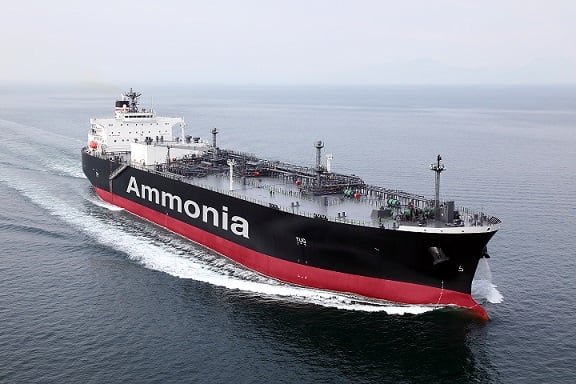A Japanese Consortium to Study Ammonia Storage and Transport Solutions
A consortium comprising several Japanese companies and organizations has been handpicked by compatriot New Energy and Industrial Technology Development Organization (NEDO) to partake in a feasibility study program focused on new, ammonia storage and transport solutions.
As disclosed, the group, consisting of classification society ClassNK, IHI Corporation, JFE Steel Corporation, Tohoku University, and the Institute of Science Tokyo, is set to promote the engineering of stress corrosion cracking (SCC) probability evaluation tools for ammonia fuel storage tanks and transportation equipment.
According to ClassNK, the consortium’s proposal to embark on the initiative was initially given a rubber stamp of approval back in May this year, but the outsourcing agreement with NEDO was wrapped up recently.
In the first stages of the endeavor, the group will reportedly perform a study on the SCC’s mechanism involved in steel cracking due to the combined effects of mechanical stress and corrosion caused by liquid ammonia.
As informed, ClassNK is to examine the SCC mechanism of liquid ammonia and the ‘real world’ use and condition of marine ammonia transport equipment. The organization said it would also conduct long-term SCC testing and develop tools to assess SCC probability. It is understood that the findings are due to be released in ClassNK’s guidelines.
Within the scope of the last phases of the project, ClassNK shared that stakeholders would be able to formulate risk-based maintenance procedures for ammonia storage and transportation facilities, and marine fuel tanks, with the all-embracing goal of ultimately promoting the broader application of ammonia as a fuel source.
Ammonia, which does not emit carbon dioxide (CO2), is increasingly seen as one of the most viable roads to net zero, despite the fuel’s ‘unique’ set of challenges related to its toxicity and flammability. Per ClassNK, ammonia is seen as a ‘vital’ part under Japan’s Green Growth strategy as a low-impact fuel for both the maritime transport industry and thermal power stations.
Accordingly, as the classification society has stressed, the safe operation of ammonia storage tanks and transportation facilities is “critical.” As elaborated, since liquefied ammonia for storage and transportation poses SCC risks to steel surfaces, reasonable assessment procedures for inspection and maintenance are a must.
To remind, in mid-May this year, ClassNK issued novel guidelines to support the safe adoption and onboard handling of ammonia as a marine fuel. As previously reported, the guidance prioritizes the safety of seafarers and covers standard procedures, like health measures to be taken in the event of an ammonia leak, as well as requirements for personnel protection equipment (PPE) and emergency equipment.
Power Your Brand With Offshore Energy
Take the spotlight and anchor your brand in the heart of the offshore world!
Join us for bigger impact and amplify your presence in the offshore energy community!

